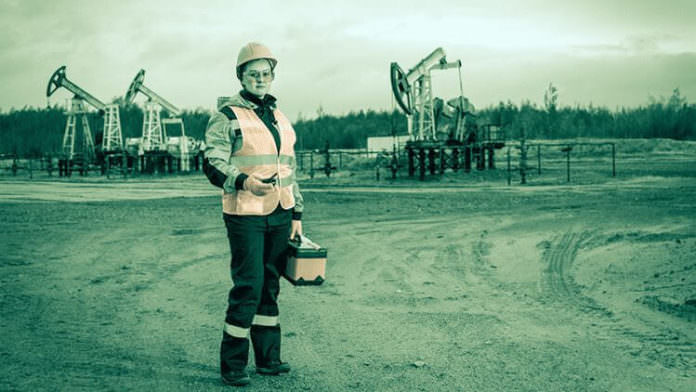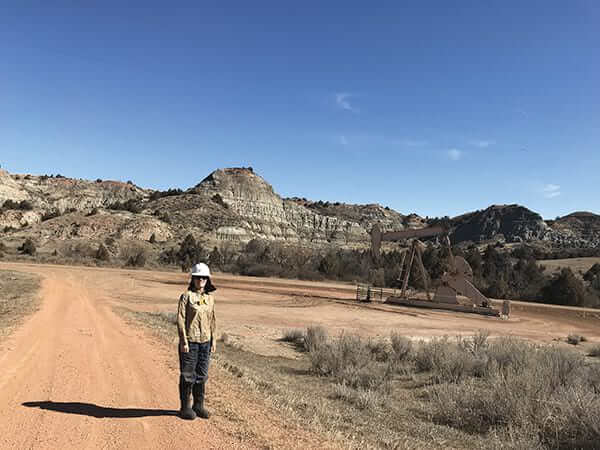
How did a woman, born and raised in Florida, with a degree from prestigious Smith College in Massachusetts find her way to the Bakken oil patch and fall in love with western North Dakota?
As I found out, it’s an interesting story.
Job opportunities in the Bakken are numerous and growing by the day. As the communities in western North Dakota have grown, you see the usual job openings that you see everywhere in the country — retail, restaurant, clerical — and more specialized opportunities in industries such as engineering, medical and skilled trades.
Jobs in the energy industry are plentiful as well. Drilling and production jobs are filled predominantly by men, but as the Bakken oil play matures we are seeing are more and more women moving into “non-traditional” roles of the energy industry. Judging by the women I have spoken to, there are no limits to the opportunities if you are willing to work hard, take responsibility and learn.
I have had the opportunity to know and visit with many women in the energy field ranging from executives in government relations to those touring the Gulf Coast to meet the people affected by the BP spill and spending time at the Canadian oil sands learning about mining, refining and transporting. The Bakken is home to many women and families in the energy field. Watching the growing communities, the sprawling opportunity and the ongoing prosperity is heartwarming.
Some say that Bakken 2.0 is more family friendly, and the pace is still fast — but nothing like before. Drilling activity will continue for another generation, however slowly the jobs picture is switching to high paying, permanent and more family-friendly positions. Women are filling critical roles and most have a story to go along with it.
Monica Bleess, born in Florida, now calls North Dakota home and loves the beauty of the Badlands and enjoys the four distinct seasons. In fact, she says, “You couldn’t get me to move back to Florida.” Monica attended Smith College, a prestigious all-women college on the east coast, and earned a degree in geoscience. She spent a short time working in a park in South Dakota when she heard about jobs in the Bakken.

Monica Bleess
With her background in geoscience, Bleess has enjoyed learning on the job as she has moved through various job opportunities. Working as a mud logger she learned all she could about the drilling process and the geology of the Bakken. She became interested in the field inspection role while visiting with a female field inspector on drilling rigs. Feeling it could be a good fit, she applied and found out it was.
Monica’s job has enough challenge and variety to keep her on her toes. The inspections vary from drilling to completion to abandonment and reclamation. With the inspection of drilling rigs, saltwater disposal and injection wells, and pipeline integrity she finds each day is new and interesting. The oil and gas process is recorded from start to finish by the inspectors assuring that state regulations are followed.
 Lisa Tonneson
Lisa Tonneson
The Bakken is now also the home of a New Yorker, a retired Navy (welder, firefighter, shipboard damage control) mother of two, grandma to one, who married a Navy man who is from North Dakota and are living back on his homestead. Lisa Tonneson has worked many jobs in the oil field from dispatcher, bookkeeper, production welder, and pumper to lead trainer of new pumpers.
Lisa’s current job with the oil and gas division of North Dakota is a field inspector. Her background and knowledge made it a perfect fit for her. Always wanting to better herself, she says that she wishes she had more education in the ever-changing world of the oil field.
 Caitlin Olsen
Caitlin Olsen
Then there is Production and Measurement Supervisor for the North Dakota Industrial Commission, Caitlin Olsen. She comes to the Bakken from southeast Minnesota with a geology background. She says, “Pick up a rock and it can tell you about history. Geology is a little bit like detective work, figuring out what the earth looks like miles below the surface.” Her job has a broad spectrum of duties requiring problem-solving skills. Her responsibilities require her to follow up with operators on how they are doing with the oil conditioning policy, the statewide gas capture goals, and metering practices.
At the height of the Bakken production, Catlin came to North Dakota to be a field inspector. She faced a steep learning curve including the slang terms used in the oilfield — it was like learning a second language — but with experience, she now has a strong understanding all the facets of the process.
 Tammy Madsche
Tammy Madsche
Tammy Madche comes to North Dakota from Wisconsin. She has a geology degree from the University of Wisconsin and has moved through various jobs in the oil and gas industry from field inspector to a reclamation specialist to, most recently, supervisor of the pipeline program. This position oversees the enforcement of the underground gathering pipeline regulations. In the Bakken there are three field inspection offices with locations in Williston, Minot and Dickinson. Tammy’s job requires (in part) managing the pipeline and inspection data from new gathering lines, repair and abandonment, and responding to gathering pipeline releases and landowner concerns.
Growing up Madche says, “I knew I wanted to become a geologist, wanting a job that gave me opportunities for field work in an environmental firm or mining company. The Bakken offered an opportunity when the market for geologists was tight, so I gave it a try.” But adds, “I wish someone had told me it is okay to not know everything right away.” The technology is ever evolving and makes it hard to be an expert in the ever-cyclical nature of the industry.
All these women are enthusiastic about their jobs and say that they would absolutely recommend the energy industry to young women and would encourage them to peruse jobs in the Bakken. Olsen adds, “Working in the Bakken has been a delightful surprise — there is a huge sisterhood for STEM women.” She continues, “I have met some of the smartest, strongest women in my life — we lift each other up”.
They all agree that the jobs are not easy, often working long hours. Madche adds, “Like many careers, you get what you put into it and if you are not driven to succeed, you likely won’t.” Tonneson says, “I have met so many individuals from various backgrounds, experience and education levels while working in the oil field… they are all valuable. Do your research and having an education will reveal many more jobs and opportunities.”
For me, a great takeaway from writing this article came from a conversation with Bleess in which she said she did not miss Florida. She shared that she loves the gorgeous land of North Dakota and the Badlands which, for her, makes it a perfect place to work. The work she does allows her to, “help manage and develop the resources carefully, responsibly and respectfully.” Hearing this about the place I was born and raised in is stirring. As a native North Dakotan, I am glad we have these — and so many other — great women working in the Bakken and adding to the history of this state.
About the author: Bette Grande is a Research Fellow for energy and environment issues at The Heartland Institute. She served as a North Dakota state Representative from 1996–2014. Grande was a member of the House Appropriations Committee, Education and Environment Division. She was born and raised in Williston, North Dakota.














